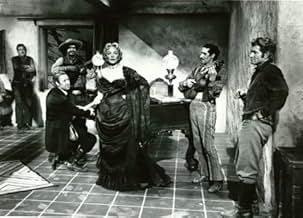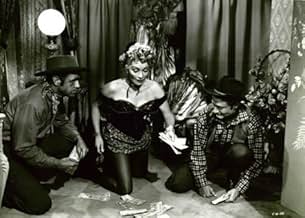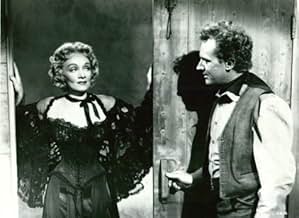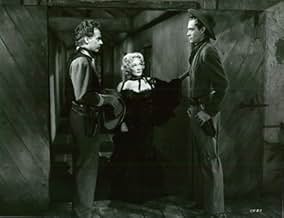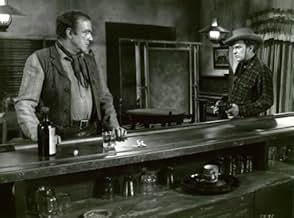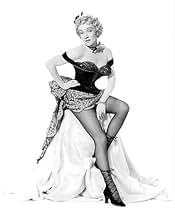AVALIAÇÃO DA IMDb
6,8/10
5,9 mil
SUA AVALIAÇÃO
Adicionar um enredo no seu idiomaAfter the murder of his fiancée, a Wyoming ranch hand sets out to find her killer.After the murder of his fiancée, a Wyoming ranch hand sets out to find her killer.After the murder of his fiancée, a Wyoming ranch hand sets out to find her killer.
- Direção
- Roteiristas
- Artistas
Rodd Redwing
- Rio
- (as Rodric Redwing)
Victor Adamson
- Racer with Fat Girl
- (não creditado)
Roger Anderson
- Red
- (não creditado)
Al Bain
- Race Spectator
- (não creditado)
Ray Beltram
- Barfly
- (não creditado)
- Direção
- Roteiristas
- Elenco e equipe completos
- Produção, bilheteria e muito mais no IMDbPro
Avaliações em destaque
When I was in school not too many years after this film came out, as I recall vividly, we were taught the evils of totalitarianism (notably of the Communist variety). One of the scariest evils, so we were told, was that people could be made not to exist - not just in the sense of being murdered, but in the sense of being erased even in memory. They did not exist. And they had never existed, even if they had. History books were doctored. Names were whited out of the index. The memory of history changed. That was the great difference between us and them. It could never happen here. We all, patriotic little kids, nodded - not here. Watch this movie and you will see it happen, here. All the characters are played by actors. All except one. One is played by a phantom. He doesn't exist. Of course, he does. He's Lloyd Gough. His character, Kinch, is the central pivot of the entire story, from the first scene. But he has been removed from the cast: no mention of his name.
Lloyd Gough and his wife Karen Morley refused to grovel before HUAC and so were blacklisted. He was also erased, retroactively. They couldn't erase his image, because he was in too many and too important scenes. But they could erase his memory. That they did. They didn't blot out his name from the many other films he had played. But they could have. Why not? It's only a short step from one retroactive erasure to many. Not too hard to reshoot the credits of old films. is it? Didn't happen. But it started. Think about that and be scared. Oh, yes, I forgot. We're past that now, just an aberration of the 1950s. Right?
Lloyd Gough and his wife Karen Morley refused to grovel before HUAC and so were blacklisted. He was also erased, retroactively. They couldn't erase his image, because he was in too many and too important scenes. But they could erase his memory. That they did. They didn't blot out his name from the many other films he had played. But they could have. Why not? It's only a short step from one retroactive erasure to many. Not too hard to reshoot the credits of old films. is it? Didn't happen. But it started. Think about that and be scared. Oh, yes, I forgot. We're past that now, just an aberration of the 1950s. Right?
First of all, the word "noir" is thrown around much too carelessly, so let's be clear: This is a Western. Pure and simple. In fact it's a pretty bad Western, really, but somehow it manages to be a lot of fun. You've got Marlene Dietrich a little past her prime with plucked and painted eyebrows that leave her facial expression in a perpetual state of surprise. There's a gunslinger named "Frenchy Fairmont," and a warbly sung narrative song throughout reminding us that this is a tale of murder and revenge. I especially liked the line (I don't remember it exactly) spoken by a doctor who rattles off a list of a cowboy's injuries and sums up by saying, "So, really, he's pretty dead."
"Rancho Notorious" isn't one of the genre's better entries, but see it some time just for its entertainment value.
"Rancho Notorious" isn't one of the genre's better entries, but see it some time just for its entertainment value.
With it being directed by the great Fritz Lang (a director with a great and distinctively Expressionistic visual and directing style, with 'M' and 'Metropolis' being two of the finest examples) and starring Marlene Dietrich (especially fond of her work with Josef von Sternberg and in 'Witness for the Prosecution'), 'Rancho Notorious' had a lot of interest value. Likewise with the story idea.
'Rancho Notorious' may not be my idea of a great film, especially for one with such a great director and an actress as talented as Dietrich. This is not to say that 'Rancho Notorious' is bad. It is far from that. While it is problematic and far from being one of Lang's best, in a way it's somewhat of a lesser effort, to me it was quite good and an interesting take on the genre. Strange and over-the-top but on the most part it's not in a bad way.
Its weak point is the main theme/song. It is used far too much, like over-explanatory narration in song form, and the actual theme is grating and heavy-handed. Didn't even think it fitted much stylistically either (sounding too jaunty for a film that started off in a gritty fashion) and the cheesiness of some of the words added to the out of kilter feel. Seeing as it features heavily, it was a big problem and made me not think highly of the music much.
The film is cheap-looking in the sets, which never look authentic and more hastily-made studio-bound settings that look like they were constructed on the remainder of a budget where most of it was blown hiring Lang and Dietrich. Arthur Kennedy's performance is slightly uneven, mostly he's fine but in the more romantic parts he looks uncomfortable and more chemistry (though it's there) with Dietrich would have been welcome.
Dietrich however, even when past prime, looks luminous and brings the right amount of charisma and toughness. Something that Kennedy also displays in his best moments. A relatively cast against type Mel Ferrer is lively support and George Reeves and Jack Elam are just as solid. Lang himself fares very well here, his direction is stylish and moody with some nice creative touches.
Also found 'Rancho Notorious' to boast some ravishingly striking cinematography. The rest of the songs are nicely sung and are placed and used better, even if one questions the necessity. The film gets off to a wonderfully gritty start that one does wish was carried further, though the over-the-top-ness was actually entertaining still and didn't jar as much as it sounds. The tension simmers beautifully and the climax scintillates, the lack of sentimentality was appreciated.
Summing up, intriguing, for Lang completests and to see how a different take on a Western can fare, and well done though Lang did much better. 7/10 Bethany Cox
'Rancho Notorious' may not be my idea of a great film, especially for one with such a great director and an actress as talented as Dietrich. This is not to say that 'Rancho Notorious' is bad. It is far from that. While it is problematic and far from being one of Lang's best, in a way it's somewhat of a lesser effort, to me it was quite good and an interesting take on the genre. Strange and over-the-top but on the most part it's not in a bad way.
Its weak point is the main theme/song. It is used far too much, like over-explanatory narration in song form, and the actual theme is grating and heavy-handed. Didn't even think it fitted much stylistically either (sounding too jaunty for a film that started off in a gritty fashion) and the cheesiness of some of the words added to the out of kilter feel. Seeing as it features heavily, it was a big problem and made me not think highly of the music much.
The film is cheap-looking in the sets, which never look authentic and more hastily-made studio-bound settings that look like they were constructed on the remainder of a budget where most of it was blown hiring Lang and Dietrich. Arthur Kennedy's performance is slightly uneven, mostly he's fine but in the more romantic parts he looks uncomfortable and more chemistry (though it's there) with Dietrich would have been welcome.
Dietrich however, even when past prime, looks luminous and brings the right amount of charisma and toughness. Something that Kennedy also displays in his best moments. A relatively cast against type Mel Ferrer is lively support and George Reeves and Jack Elam are just as solid. Lang himself fares very well here, his direction is stylish and moody with some nice creative touches.
Also found 'Rancho Notorious' to boast some ravishingly striking cinematography. The rest of the songs are nicely sung and are placed and used better, even if one questions the necessity. The film gets off to a wonderfully gritty start that one does wish was carried further, though the over-the-top-ness was actually entertaining still and didn't jar as much as it sounds. The tension simmers beautifully and the climax scintillates, the lack of sentimentality was appreciated.
Summing up, intriguing, for Lang completests and to see how a different take on a Western can fare, and well done though Lang did much better. 7/10 Bethany Cox
When his fiancé Beth is raped and murdered during a robbery, peace-loving rancher Vern Haskell sets out to track down the man that did it. Driven by a desire for revenge more than justice, Haskell follows the trail to a casino and bordello called Chuck-A-Luck. Here he follows his leads to Alter Keane and gunslinger French Fairmont; they take him onto their staff at their horse ranch and gang HQ and Haskell hopes to use his cover to get his closer to finding out who it was that raped his girl. However in keeping his cover, Haskell finds himself drawn into their world more and more.
The staples of westerns of the period are all here revenge, Technicolor, songs and romance; however this film opens with a rape (and it is fairly obvious that it was a violent rape) and a nice man who descents into violent anger. In a way the film makes this its central theme but it doesn't continue in this very strong vein and softens it somewhat with the addition of romance and musical interludes. From here on in it is still enjoyable but never marks itself out as more than a solid genre western; the complexities that I had hoped would consume him were not to be found in Haskell to any great degree. Despite this the plot still works well enough to engage and the gruff pace avoids sentimentality and makes the tough romance easier to swallow in context. The action is roundly enjoyable and Lang directs well within the sets, providing some good shots that stick in the mind.
The cast are mixed but generally meet the standard required of them. Dietrich may have demanded she be made to look as young as possible but her age helps stand her apart from the usual love interest actresses. She is tough and enjoyable in her role but I could have done without the songs. Kennedy is reasonably good but not too comfortable with his character he is either a white knight or a gurning ball of rage; subtlety is not his key word. Ferrer is lively and fun and makes more of his character than the genre usually allows the "other man" character to do. Support from Elam, Reeves and others is all solid enough to make it work.
So an enjoyable genre western then but a bit disappointing for throttling back after such a tough start. The standard revenge plot is made more interesting by the change in Haskell but it could have been better; meanwhile the usual action, songs and romance all work pretty well and will easily please genre fans.
The staples of westerns of the period are all here revenge, Technicolor, songs and romance; however this film opens with a rape (and it is fairly obvious that it was a violent rape) and a nice man who descents into violent anger. In a way the film makes this its central theme but it doesn't continue in this very strong vein and softens it somewhat with the addition of romance and musical interludes. From here on in it is still enjoyable but never marks itself out as more than a solid genre western; the complexities that I had hoped would consume him were not to be found in Haskell to any great degree. Despite this the plot still works well enough to engage and the gruff pace avoids sentimentality and makes the tough romance easier to swallow in context. The action is roundly enjoyable and Lang directs well within the sets, providing some good shots that stick in the mind.
The cast are mixed but generally meet the standard required of them. Dietrich may have demanded she be made to look as young as possible but her age helps stand her apart from the usual love interest actresses. She is tough and enjoyable in her role but I could have done without the songs. Kennedy is reasonably good but not too comfortable with his character he is either a white knight or a gurning ball of rage; subtlety is not his key word. Ferrer is lively and fun and makes more of his character than the genre usually allows the "other man" character to do. Support from Elam, Reeves and others is all solid enough to make it work.
So an enjoyable genre western then but a bit disappointing for throttling back after such a tough start. The standard revenge plot is made more interesting by the change in Haskell but it could have been better; meanwhile the usual action, songs and romance all work pretty well and will easily please genre fans.
I'm not a Marlene Dietrich fan and don't really see Arthur Kennedy as being charismatic enough to interest her, and am not usually keen on background ballads, but I enjoyed this film from beginning to end.
Director Fritz Lang keeps the pace lively and brightens up the generally sombre mood with a couple of light-hearted sequences - first the "horse-race" with saloon girls riding cowboys and then the crooked politicians awaiting their fate in gaol.
"Variety" Film Guide calls the plot "corny", but it's no more so than many other films of the 1950s, or indeed of any other decade, and it's different to most Westerns of the period. And for those times it's also relatively direct in its treatment of sex; we are left in no doubt that Kennedy's fiancée has been raped and that the man Kennedy suspects of the assault is obviously out for what he can get from women.
One is not told how Kennedy acquires his gun-fighting skills - at the beginning a posse member points out his lack of these. The only weakness are a couple of "outdoor" scenes obviously filmed in the studio, where the rock formations are eye-catchingly unrealistic.
The acting is generally good, with Kennedy doing well as the grief- stricken hero seeking revenge and Mel Ferrer showing screen-presence as the slightly sinister and somewhat sensitive fast gun.
Director Fritz Lang keeps the pace lively and brightens up the generally sombre mood with a couple of light-hearted sequences - first the "horse-race" with saloon girls riding cowboys and then the crooked politicians awaiting their fate in gaol.
"Variety" Film Guide calls the plot "corny", but it's no more so than many other films of the 1950s, or indeed of any other decade, and it's different to most Westerns of the period. And for those times it's also relatively direct in its treatment of sex; we are left in no doubt that Kennedy's fiancée has been raped and that the man Kennedy suspects of the assault is obviously out for what he can get from women.
One is not told how Kennedy acquires his gun-fighting skills - at the beginning a posse member points out his lack of these. The only weakness are a couple of "outdoor" scenes obviously filmed in the studio, where the rock formations are eye-catchingly unrealistic.
The acting is generally good, with Kennedy doing well as the grief- stricken hero seeking revenge and Mel Ferrer showing screen-presence as the slightly sinister and somewhat sensitive fast gun.
Você sabia?
- CuriosidadesCinematographer Hal Mohr, who had previously photographed Marlene Dietrich in Atire a Primeira Pedra (1939), attempted to resign from the film because of 50-year-old Dietrich's insistence that he use lighting to make her look much younger than she actually was, and Mohr didn't think it was possible.
- Erros de gravaçãoWhen Haskell and Fairmont are in the cell and talking about gambling, one of them refers to a Chuck-a-Luck "Wheel". There is no wheel in Chuck-a-Luck. Chuck-a-Luck is a dice game played with (two or) three dice often contained in an hour-glass shaped rotatable cage. Bets are placed as to what number will come up on gaming table. The game played in the film involves a wheel with pegs in between representations of all the possible 3-dice rolls, which is the wheel that is both talked and sung about. This is a variation on the original game called Big Six Wheel. Because of the distribution of the combinations, the house advantage or edge for this wheel is greater than for Chuck-a-Luck.
- Citações
Altar Keane: [to Vern] I'd wish you go away... and come back ten years ago.
- Cenas durante ou pós-créditosAs the title song plays and Bill Lee sings the lyric "... and a man of steel ..." there are eleven names of supporting actors on screen, and the name in the central position is George Reeves, soon to be cast as The Man of Steel in *The Adventures of Superman* (1952-58).
- ConexõesEdited into Histoire(s) du cinéma: Fatale beauté (1994)
Principais escolhas
Faça login para avaliar e ver a lista de recomendações personalizadas
- How long is Rancho Notorious?Fornecido pela Alexa
Detalhes
- Data de lançamento
- País de origem
- Idioma
- Também conhecido como
- El refugio
- Locações de filme
- Empresa de produção
- Consulte mais créditos da empresa na IMDbPro
Bilheteria
- Orçamento
- US$ 900.000 (estimativa)
- Faturamento bruto mundial
- US$ 63
- Tempo de duração
- 1 h 29 min(89 min)
- Cor
- Proporção
- 1.37 : 1
Contribua para esta página
Sugerir uma alteração ou adicionar conteúdo ausente

